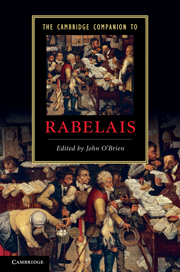Book contents
- Frontmatter
- 1 Introduction
- 2 Reading the works of Rabelais
- 3 Laughing in Rabelais, laughing with Rabelais
- 4 Interpretation in Rabelais, interpretation of Rabelais
- 5 Making sense of intertextuality
- 6 Pantagrueline humanism and Rabelaisian fiction
- 7 Putting religion in its place
- 8 Pantagrue and Gargantua: The political education of the king
- 9 Histories Natural and Unnatural
- 10 Reading and unraveling Rabelais through the Ages
- Guide to further reading
- Index
4 - Interpretation in Rabelais, interpretation of Rabelais
Published online by Cambridge University Press: 28 January 2011
- Frontmatter
- 1 Introduction
- 2 Reading the works of Rabelais
- 3 Laughing in Rabelais, laughing with Rabelais
- 4 Interpretation in Rabelais, interpretation of Rabelais
- 5 Making sense of intertextuality
- 6 Pantagrueline humanism and Rabelaisian fiction
- 7 Putting religion in its place
- 8 Pantagrue and Gargantua: The political education of the king
- 9 Histories Natural and Unnatural
- 10 Reading and unraveling Rabelais through the Ages
- Guide to further reading
- Index
Summary
Few works of fiction in the canon of French literature have been subjected to so many - and so widely divergent - interpretations as Rabelais's Gargantua and Pantagruel chronicles; and few, beyond the great allegorical narratives of the Middle Ages, appear to give so central a role to interpretation itself, either as a premise or as a theme - by requesting it of actual or implied readers, or by showing fictional characters engaged in hermeneutic tasks, with effects ranging from the perplexing to the hilarious. The first book of Pantagruel, for example, offers a series of episodes in which what is said or signified defies comprehension. In one of the most amusing, Panurge and a philosopher named Thaumaste (“Admirable”) hold a debate in which, at the latter's demand, only signs are used in lieu of the spoken word. The dispute is supposed to deal with the sulfurous secrets of geomancy and the Cabbala (F194/H282), or so Thaumaste believes: he proclaims himself convinced by Panurge's elaborate gestures, in which others might recognize common obscene signs instead of cabbalistic significations. Gargantua, for its part, begins with an Author's Prologue dedicated to the issue of interpretation, quickly followed by an opaque piece of verse, the Antidoted Frigglefraggles (F9-12/H11-14). Symmetrically, the book ends with a “prophetic riddle,” also in verse, found on a bronze plate in the foundations of the newly built Abbey of Thßlème.
- Type
- Chapter
- Information
- The Cambridge Companion to Rabelais , pp. 43 - 56Publisher: Cambridge University PressPrint publication year: 2010



